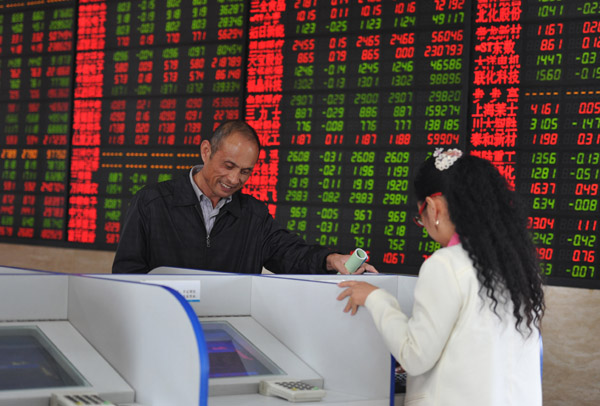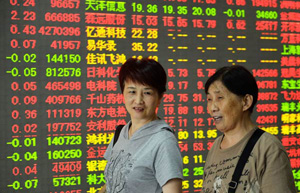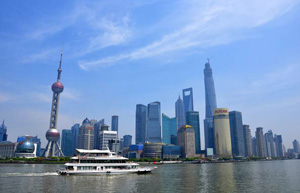 |
|
Investors check share prices at a branch of a securities firm in Fuyang, Anhui province, on Oct 13, 2014. The Shanghai Composite gauge rallied 15 percent in the third quarter. [Provided to China Daily] |
Growing interest in Chinese A shares generates huge cash inflows for funds
The fund managers running the X-trackers Harvest CSI 300 China A-Shares ETF at Deutsche Asset & Wealth Management are facing a problem their rivals would love to have. They are luring too much money.
In the span of five days last month, the US-based exchange-traded fund pulled in $130 million, sending assets surging by 33 percent to $515 million and nearly exhausting its Chinese government-imposed A-share purchasing quota. Managers were forced to get creative. They limited new creations and borrowed quota from another fund to avoid closing the year-old ETF to inflows and keep a potentially disruptive premium to underlying assets from developing.
Their dilemma highlights what is likely to become an increasingly common predicament as fund providers from BlackRock Inc to CSOP Asset Management Ltd look to follow suit and open up China's more than $4 trillion A-shares market to US ETF investors. How should they handle growing demand for exposure to mainland companies from Industrial Bank Co to Gree Electric Appliances Inc even as Beijing continues to ration out the quota foreign ETF providers need?
"The A-share market has gotten a lot of attention," Dodd Kittsley, the New York-based global head of ETF national accounts and strategist at Deutsche Bank AG's Deutsche Asset & Wealth Management unit, said in a telephone interview. "We've been proactive in trying to create capacity without quota."
Surging demand has been fueled in part by the biggest quarterly gain for mainland stocks since 2009. The Shanghai Composite gauge rallied 15 percent in the third quarter, even as the MSCI Emerging Markets Index fell 4.3 percent.
To deal with the influx of new money, Frankfurt-based Deutsche Asset & Wealth Management said Sept 11 that the ETF would accept just one creation unit per day. A unit represents 50,000 shares or about $1.3 million at current valuation.
"We wanted to maintain a valve of liquidity, increasing the fund size but doing so in a measured way, in anticipation of getting a higher quota," Kittsley said.
A Qualified Foreign Institutional Investor license, known as a QFII, or Renminbi Qualified Foreign Institutional Investor license, known as an RQFII, is needed for foreign asset managers to buy A shares. Once the license is obtained, the investor also needs to submit an application to China's State Administration of Foreign Exchange for a specific dollar amount of investment quota that they can use to buy mainland stocks.
US-based asset managers currently are not eligible to apply for a license directly, and therefore use sub-advisers to secure quota.
Deutsche Bank has also taken advantage of excess quota from its sister product, the Deutsche X-trackers Harvest CSI 500 China A-Shares Small Cap Fund, and is investing on a limited basis in futures contracts to meet investor demand.
That has helped keep the ETF's premium over its net asset value from spiking. The fund has actually traded at an average discount of 0.29 percentage point to its underlying securities over the past month, Bloomberg data show.
BlackRock, the world's largest money manager, is looking to roll out a competing US-based product, the iShares MSCI China A ETF, that would similarly invest directly in Chinese equities trading on the Shanghai and Shenzhen stock exchanges, according to a Sept 15 US regulatory filing.
|
 |
 |
| Unified securities account platform launched | Shanghai-HK Stock Connect: All you need to know |
